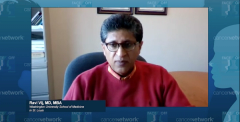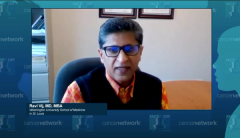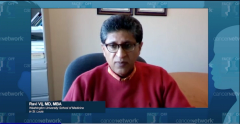
MAIA trial Supports Use of D-Rd in Transplant-Ineligible Patients With Myeloma
Luciano J. Costa, MD, PhD discussed updating findings from the phase 3 MAIA trial of the triplet combination of daratumumab, lenalidomide, and dexamethasone in transplant-ineligible patients with newly diagnosed multiple myeloma.
Episodes in this series

As part of CancerNetwork’s Face-Off video series, Luciano J. Costa, MD, PhD, professor of medicine - hematology and oncology, Department of Medicine, University of Alabama at Birmingham, discussed an updated analysis of the phase 3 MAIA trial (NCT02252172), designed to evaluate daratumumab (Darzalex), lenalidomide (Revlimid), and dexamethasone (D-Rd) in transplant-ineligible patients with newly diagnosed multiple myeloma.
Costa: So the MAIA trial was a randomized phase 3 trial that [took] what was, at a time, considered standard of care for patients with newly diagnosed multiple myeloma that are considered not eligible for transplant, which is mostly in Europe where this trial was mostly conducted, in patients over the age of 70. [It] compared the standard of care for those patients with a combination of a lenalidomide and dexamethasone, with a combination of the lenalidomide, dexamethasone, and the anti-CD38 monoclonal antibody daratumumab. All drugs were continued until progression, intolerance, or loss of follow-up.
The study [was] reported initially as showing an incredible benefit for the triplet combination arm in progression-free survival. And most recently has been updated to show also improvement in overall survival, making the combination of D-Rd standard of care for newly diagnosed myeloma patients who are not eligible for autologous transplant.
What was presented recently at [the 2022 American Society of Hematology Annual Meeting and Exposition] was also follow-up life assessment, showing that not only you have more frequent responses and deeper responses and longer-lasting response, but also you have the expected improvement in quality of life associated with the use of D-Rd.
What is, to me, most impressive about the trial is with a regimen that is used in patients who were, for the most part, in their 70s, the median progression-free survival now exceeds 5 years, which [at a] time not so long ago, would be considered outstanding for much younger patients treated with autologous transplant.
The MAIA [trial] provides the highest level of evidence to support D-Rd for patients with newly diagnosed multiple myeloma. We do have another regimen that is bortezomib [Velcade], lenalidomide and dexamethasone that has, for the longest time, been considered standard [of care] for this population. Based on the findings, the SWOG-S0777 trial [NCT00644228], to this day, bortezomib, lenalidomide, and dexamethasone has not been directly compared with lenalidomide and dexamethasone. There are some proposed studies that might do just that.
What I think we are seeing and will continue to see, in the United States at least, is the increased adoption for D-Rd as initial therapy for patients that are not eligible for transplant, particularly older patients. In many institutions, including our own, have made that the default regimen for those patients, particularly if a clinical trial is not immediately available.
Transcription edited for clarity.
Newsletter
Stay up to date on recent advances in the multidisciplinary approach to cancer.










































